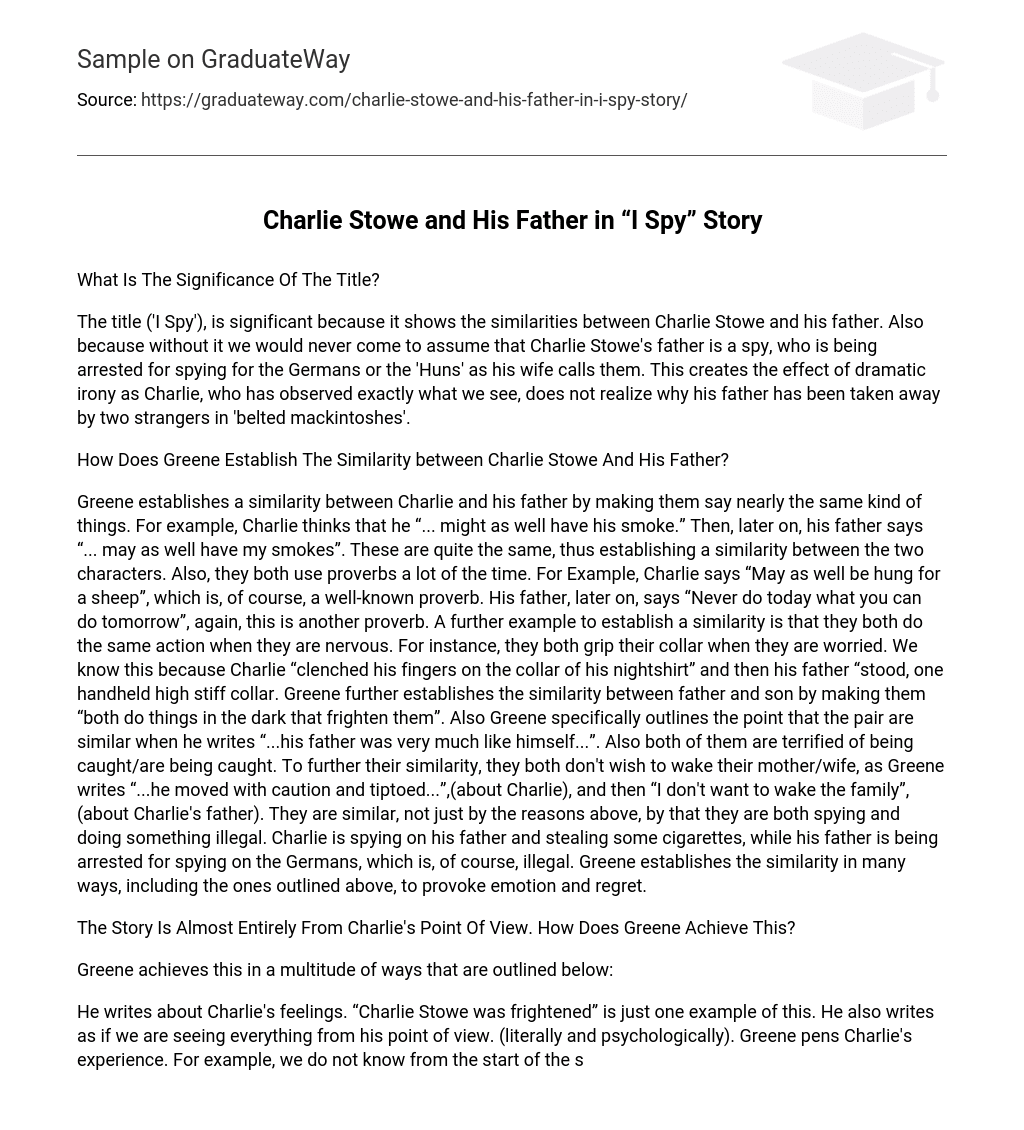What Is The Significance Of The Title?
The title (‘I Spy’), is significant because it shows the similarities between Charlie Stowe and his father. Also because without it we would never come to assume that Charlie Stowe’s father is a spy, who is being arrested for spying for the Germans or the ‘Huns’ as his wife calls them. This creates the effect of dramatic irony as Charlie, who has observed exactly what we see, does not realize why his father has been taken away by two strangers in ‘belted mackintoshes’.
How Does Greene Establish The Similarity between Charlie Stowe And His Father?
Greene establishes a similarity between Charlie and his father by making them say nearly the same kind of things. For example, Charlie thinks that he “… might as well have his smoke.” Then, later on, his father says “… may as well have my smokes”. These are quite the same, thus establishing a similarity between the two characters. Also, they both use proverbs a lot of the time. For Example, Charlie says “May as well be hung for a sheep”, which is, of course, a well-known proverb. His father, later on, says “Never do today what you can do tomorrow”, again, this is another proverb. A further example to establish a similarity is that they both do the same action when they are nervous. For instance, they both grip their collar when they are worried. We know this because Charlie “clenched his fingers on the collar of his nightshirt” and then his father “stood, one handheld high stiff collar. Greene further establishes the similarity between father and son by making them “both do things in the dark that frighten them”. Also Greene specifically outlines the point that the pair are similar when he writes “…his father was very much like himself…”. Also both of them are terrified of being caught/are being caught. To further their similarity, they both don’t wish to wake their mother/wife, as Greene writes “…he moved with caution and tiptoed…”,(about Charlie), and then “I don’t want to wake the family”,(about Charlie’s father). They are similar, not just by the reasons above, by that they are both spying and doing something illegal. Charlie is spying on his father and stealing some cigarettes, while his father is being arrested for spying on the Germans, which is, of course, illegal. Greene establishes the similarity in many ways, including the ones outlined above, to provoke emotion and regret.
The Story Is Almost Entirely From Charlie’s Point Of View. How Does Greene Achieve This?
Greene achieves this in a multitude of ways that are outlined below:
He writes about Charlie’s feelings. “Charlie Stowe was frightened” is just one example of this. He also writes as if we are seeing everything from his point of view. (literally and psychologically). Greene pens Charlie’s experience. For example, we do not know from the start of the story that his father was spying on the Germans, it is only near the end we start to realize that his father was doing such devious acts of criminality. The story begins with Charlie alone getting out of bed and then ends when Charlie falls asleep. It is like we are looking over his shoulder all the time. Also, we don’t know anything about Charlie, so a lot of the description is left to our imagination, so it is as if we have been plunged into the tale with no prior knowledge of Charlie and his capers.
All of this gives off a sense of dramatic irony because, although we still see what Charlie sees, we can deduce things that Charlie cannot because of his limited mental ability as a twelve-year-old.
There are many atmospheres created by Greene. So many in fact that I will only list some of them. These are:
An air of mystery. This is created through the description, or rather lack of it! This is because we know next to nothing about Charlie Stowe, and even less about his father! Also, there is a rather menacing feel about the story. This is because of the use of “lurking” as in ‘…the ‘Huns’ who, the monsters lurking in the Zeppelins in the clouds”. There is also an atmosphere regarding indifference, when it comes to stealing the cigarettes. This is because Charlie doesn’t even bat an eyelid when he takes some of his father’s merchandise. Finally, there is a general sense of regret at the end of the story as Charlie realizes that “It would have pleased him to go down to his father and tell him that he loved him”, but it was all too late for him as “he could hear through the window, the quick steps going away”.





